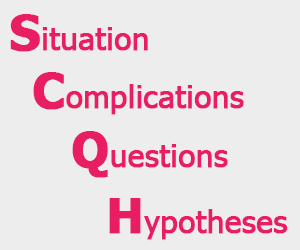In the seventh of nine articles exploring things he has found surprising in business, Peter Massey explains how to better understand complex problems and make more informed decisions.
Complication is everywhere. So why haven’t we got used to it, why do we over-simplify, why does it distract still? The power of alignment. Extracting key questions, data and decision-making need not be rocket science.
Complexity Is All Around Us
Complexity is natural and all around us. Simple systems are complicated by the randomness and variety of human behaviour and interaction, by changes over time, and by the connectedness of everything.
We Tend to Overgeneralize
We, as people, have a tendency to simplify complex situations and ideas in order to make them easier to understand and process.
This is because our brains are wired to seek patterns and categorize information in order to quickly make decisions and navigate our environment.
However, this tendency to simplify can also lead to poor listening and jumping to incorrect conclusions, especially when dealing with complex problems.
We, as humans, tend towards overgeneralization, biases and narrow-mindedness, where we rely on preconceived notions and ignore relevant information that does not fit our mental model.
Heuristics = Mental Shortcuts
Another reason is our tendency to rely on ‘heuristics’, or mental shortcuts, when making decisions.
Heuristics can be useful in many situations, but they can also lead us astray when dealing with complex problems.
Availability Heuristic
For example, the availability heuristic is the tendency to estimate the likelihood of an event based on how easily we can recall similar examples.
This can cause us to overestimate the likelihood of rare events, such as winning the lottery, if we have seen a lot of advertisements or news stories about it.
Confirmation Bias
Confirmation bias is another common issue when dealing with complexity. This is the tendency to seek out and give more weight to information that supports our existing beliefs and ignore information that challenges them.
This can lead us to reinforce our beliefs and ignore important details, resulting in incomplete or incorrect conclusions.
How to Train Your Mind to Better Handle Complexity
Develop a Growth Mindset
To better handle complexity, it is important to develop a growth mindset, where you embrace challenges and see mistakes as opportunities to learn and improve.
This requires a willingness to question your beliefs and assumptions, as well as to seek out diverse perspectives and consider alternative explanations.
It is also helpful to cultivate a curious and open-minded attitude, and to take time to reflect on your thinking process.
Additionally, you can use various tools and techniques to manage complexity and avoid these pitfalls. For example, breaking down complex problems into smaller, more manageable parts can help you to understand and analyse the different components.
Mind mapping, concept maps, and flowcharts can be used to visually organize information and identify patterns and relationships.
Try the SCQH Technique

A favourite technique for big problems, which I learned and love to use, is called SCQH – situation, complications, questions, hypotheses.
This framework empowers you to gather all the facts and evidence, identify the unknowns and confusing opinions, deduce the critical questions needed to clarify the situation, and form potential answers to the key questions as your hypotheses – to prove or disprove by getting more data.
Read Articles and Books From Different Perspectives
Using a variety of information sources can help you to better understand complex issues and make more informed decisions.
For example, reading articles and books from different perspectives, talking to experts in different fields, and seeking out opposing viewpoints can help you to gain a more comprehensive understanding of a situation.
Regularly Seek Feedback
Finally, it is important to seek out feedback and seek to continuously learn and improve. By regularly reflecting on your thought processes and seeking feedback from others, you can identify any biases or assumptions that may be hindering your ability to handle complexity.
To Conclude

In conclusion, handling complexity requires a combination of a growth mindset, the use of tools and techniques to manage information, and a commitment to continuous learning and improvement.
By developing these skills and habits, you can better understand complex problems and make more informed decisions. But you won’t change the human heuristics – you have to make them conscious and work with them.
Written by: Peter Massey at Budd
If you liked this article from Peter, read these articles next:
- Everybody Needs Some Maths and Basic Stats
- Why Can’t Everyone Think Backwards?
- Is Age Little More Than a Number?
- Why Does Sight, Smell, and Sound Matter in the Contact Centre?
Author: Peter Massey
Published On: 1st Mar 2023 - Last modified: 6th Jan 2026
Read more about - Skills, Peter Massey, Skill Development















